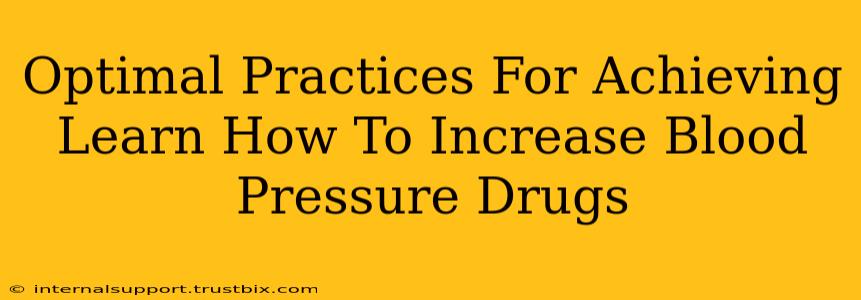Many people search for ways to increase blood pressure, often due to underlying medical conditions. However, it's crucial to understand that self-treating low blood pressure (hypotension) is dangerous. This guide focuses on safe and effective strategies for managing blood pressure, both high and low, under the guidance of a healthcare professional. Always consult your doctor before making any changes to your medication or lifestyle.
Understanding Blood Pressure and Its Management
Blood pressure is the force of blood against your artery walls. It's measured in millimeters of mercury (mmHg) and expressed as two numbers: systolic (top number) and diastolic (bottom number). High blood pressure (hypertension) is generally considered to be 140/90 mmHg or higher, while low blood pressure (hypotension) is typically below 90/60 mmHg.
Important Note: What constitutes "low" or "high" blood pressure can vary based on individual factors like age, health conditions, and medication. Your doctor will consider these factors when determining your ideal blood pressure range.
When to Seek Medical Attention Regarding Blood Pressure
Don't attempt to self-treat blood pressure issues. Seek immediate medical attention if you experience:
- Symptoms of high blood pressure: Severe headache, dizziness, shortness of breath, nosebleeds, blurred vision.
- Symptoms of low blood pressure: Dizziness, fainting, lightheadedness, nausea, blurred vision.
- Sudden changes in blood pressure: A significant increase or decrease from your usual readings.
Lifestyle Modifications for Blood Pressure Management
Lifestyle changes are crucial for managing blood pressure, whether high or low. These modifications, in conjunction with medical advice and any prescribed medication, can significantly improve your health outcomes.
For High Blood Pressure:
- Diet: Adopt a DASH (Dietary Approaches to Stop Hypertension) diet, rich in fruits, vegetables, whole grains, and low in saturated and trans fats, sodium, and cholesterol.
- Exercise: Regular physical activity, such as brisk walking, cycling, or swimming, strengthens the heart and improves blood flow.
- Weight Management: Maintaining a healthy weight reduces strain on your cardiovascular system.
- Stress Reduction: Techniques like yoga, meditation, and deep breathing can help lower stress hormones that contribute to high blood pressure.
- Limit Alcohol and Caffeine: Excessive consumption of both can negatively impact blood pressure.
- Quit Smoking: Smoking damages blood vessels and increases blood pressure.
For Low Blood Pressure:
- Increase Salt Intake (With Caution): A slight increase in sodium intake under strict medical supervision might be recommended for some individuals with low blood pressure. However, this is not universally advised, and the amount should be carefully controlled to avoid other health issues.
- Increase Fluid Intake: Dehydration can worsen low blood pressure. Drinking plenty of fluids, especially water, can help.
- Elevate Your Legs: Elevating your legs when resting can improve blood flow back to the heart.
- Avoid Prolonged Standing: This can reduce blood flow to the brain, potentially causing dizziness or fainting.
- Compression Stockings: These may help improve blood circulation in the legs.
- Consult Your Doctor: They will assess the underlying cause of your low blood pressure and recommend appropriate treatment.
Medication for Blood Pressure Management
Your doctor may prescribe medication to manage your blood pressure if lifestyle changes alone are insufficient. These medications can include:
- For High Blood Pressure: Diuretics, ACE inhibitors, beta-blockers, calcium channel blockers, and angiotensin receptor blockers (ARBs).
- For Low Blood Pressure: The treatment depends on the underlying cause. Your doctor might prescribe medication to address the underlying issue or recommend strategies to increase blood volume.
Remember: Never adjust your medication dosage without consulting your doctor.
Monitoring Your Blood Pressure
Regularly monitoring your blood pressure is vital. You can purchase a home blood pressure monitor to track your readings. However, remember that these readings are for your information only, and regular check-ups with your doctor remain crucial for accurate diagnosis and management.
Conclusion: A Holistic Approach to Blood Pressure Management
Managing blood pressure effectively involves a holistic approach that combines lifestyle modifications, medical advice, and, when necessary, medication. By working closely with your healthcare provider and implementing these strategies, you can significantly improve your cardiovascular health and overall well-being. Prioritize regular check-ups and always follow your doctor's recommendations.

